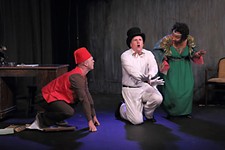Wit
This Pulitzer Prize-winner is a terminal-disease drama that still has the power to move us
Reviewed by Robert Faires, Fri., March 23, 2012
Wit
City Theatre, 3823-D Airport, 524-2870www.citytheatreaustin.org
Through April 8
Running time: 2 hr.
Moments before, the figure on the stage had held it like a general on the field of battle: standing erect, assured of her place, and proud, confident of victory, the gleam in her eyes revealing both an intelligence whetted like the edge of a saber and her willingness to wield it to cut those in her path. But now she lies on a bed, curled up like a fetus, every muscle clenched, a human ball of misery whose only sound is a primitive, pitiful howl. The cancer that has been eating away at the life of this eminent scholar is close to delivering the killing blow, and no mind, no matter how learned or keen it may be, can stand against the body breaking down.
Despite the pandemic of terminal-disease dramas that has spread across the world's stages and cable-TV channels in the 16 years since the premiere of Wit, this Pulitzer Prize-winner still has the power to move. Much of that is because of the tension playwright Margaret Edson creates between that failing flesh and the still-vibrant mind contained within it. Edson's heroine is an academic specializing in the verse of John Donne – specifically, the Holy Sonnets that roil with the poet's anxieties over sin, salvation, and capital-D death – and she's developed a fearsome reputation among students for her rigorous study of the texts, right down to the punctuation in various editions. She sees a world of meaning in a semicolon, a cosmos in a comma. But once she's diagnosed with an advanced case of metastatic ovarian cancer and enters the hospital for an aggressive form of treatment, this scholar's formidable intellect is no use; it can't check the spread of disease within her or even offer assistance to the medical team that's working to do so. In this realm, the esteemed and feared Dr. Vivian Bearing is merely a mass of meat to be irradiated, poked, and checked. It is, needless to say, a deeply humbling experience, and by forcing it upon someone whose life has truly been a life of the mind and one elevated high above the norm, Edson makes the experience all the more dramatic – as Donne himself might have it, a fall from heaven to Earth.
In the City Theatre Company's production, Judith Laird doesn't display much of the imperiousness ascribed to Bearing in the play, but in her performance, the character's great mind is always in evidence. The actress speaks with deliberation, weighing each word for meaning and relishing those she finds apt with an extra dash of articulation. The gravity with which she discusses Donne's poetry conveys the sense of a lifetime's commitment to the material and an intimacy with it – an intimacy that extends to almost nothing else in Bearing's world: not her family (she has none), not her peers (she has few), not her students (she keeps her distance). Bearing has fled from humanity to lie in the arms of John Donne, but now she finds she needs more than a 17th century metaphysical sonneteer to keep her warm.
Bearing's journey toward death and toward some grasp of a life that she's known only from books is a quiet one as rendered here. Director Jeff Hinkle leaves space for the silence that inhabits hospital rooms like an ever-present phantom visitor. It communicates a sense of the isolation and loneliness that Bearing endures, and we can sense it prodding her to make more of a connection to the hospital staff on her case, especially her nurse and the all-business research resident who happens to have taken her class once. The pair are a study in contrasts regarding the contact Bearing seeks. Clay Avery's resident displays all the bedside manner of an ice cube, looking perpetually as if he just heard someone offstage call his name and needs to get back there. Vanessa Marie's nurse, meanwhile, is always focused on her patient, keeping her gaze locked on Laird's Bearing; her soft-spoken performance provides a portrait of untempered concern and compassion for one human being from another.
From this exchange and in the visit from Bearing's aged mentor – Kristen Bennett, generating a gentle warmth in a role she's several decades too young for – we can see a transformation occur in Laird's character, a softening of that intellectual resolve by the comfort she has received. The mind may have had to surrender to the body, but the body in turn has had to yield to the heart. Through simple gifts – a Popsicle, a child's bedtime story, an embrace – this intellectual has made peace with her dying body and the issues that so confounded the subject of her life's work. Edson ends her play with an image of Bearing that combines the valedictory with great vulnerability. In the City Theatre production, Laird looks to be shedding her earthly suffering along with her hospital gown and serenely accepting a salvation that was hers all along.











